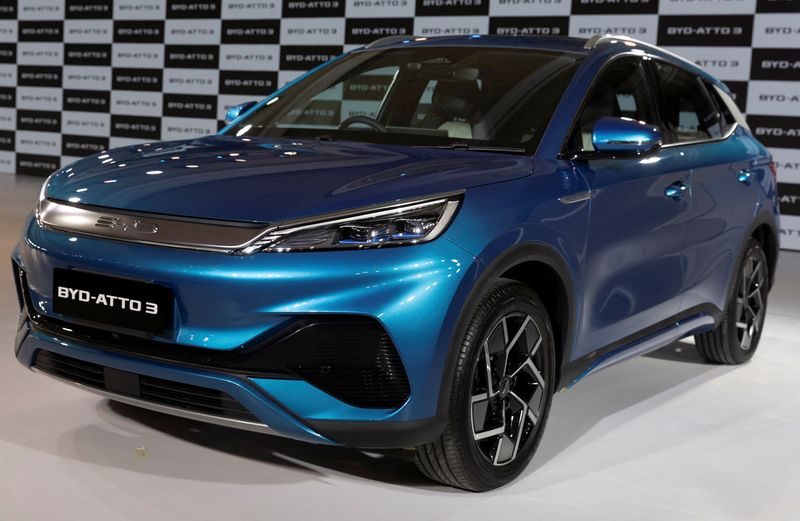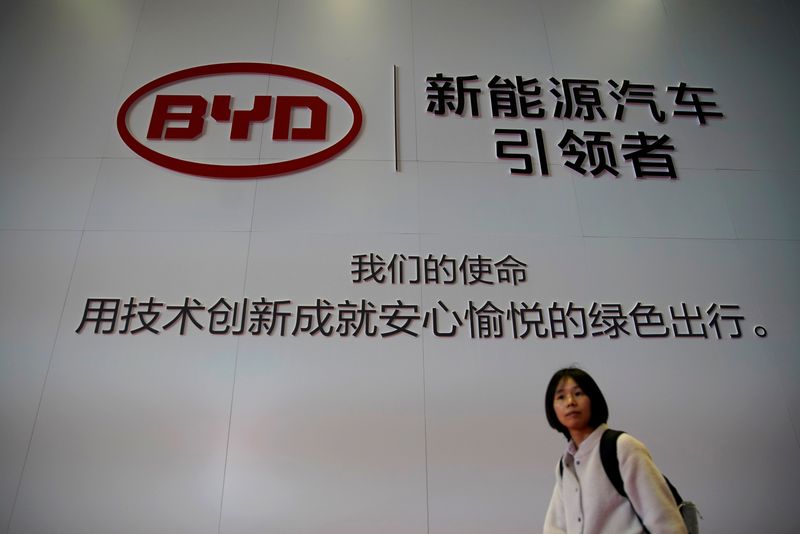By Aditi Shah
NEW DELHI (Reuters) -Warren Buffet-backed Chinese electric carmaker BYD launched its first passenger car in India on Tuesday, an electric sport-utility vehicle (SUV), marking its entry into the mainstream market amid a broader global expansion.
BYD launched the Atto 3 electric SUV, fitted with its renowned Blade battery technology, with a plan to corner 40% of the country's electric car market by 2030.
The move comes amid a wider global push by the Chinese carmaker which has begun selling EVs and plug-in electric hybrids in markets around the world, including Norway, New Zealand, Singapore, Brazil, Costa Rica and Colombia.
Earlier this year, BYD said it would start selling its passenger EVs in Japan from 2023 and also set up a facility in Thailand to produce cars from 2024.
"India will be one of the key markets in BYD's global portfolio," Sanjay Gopalakrishnan, senior vice president of electric passenger vehicles at BYD India, told Reuters.
Over the next year, BYD intends to sell 15,000 units of the Atto 3 in India, where it has already invested over $200 million, and plans to set up a local manufacturing facility in due course, it said in a statement.
Forecaster LMC Automotive expects BYD's global sales to grow to 180,000 units by 2030 from an estimated 18,000 units in 2022, paling against the outlook for China sales that are projected to reach 2.6 million units by 2030 from an estimated 1.9 million units in 2022.
BYD's India push comes amid tight scrutiny of investments from bordering nations, including China. Strict controls on such incoming investments forced Chinese carmaker Great Wall to shelve its $1 billion India entry plan.
Gopalakrishnan said BYD already has a manufacturing plant in India where the annual capacity can go up to 15,000 units, indicating no immediate need for investment. Beyond that the company is "still exploring" what it needs to do, he said.
The Shenzhen-based auto and battery producer, which includes Buffett's Berkshire Hathaway (NYSE:BRKa) as an investor, has taken a cautious path to growing in India - a market it entered in 2007 producing batteries and components for mobile phone makers.
In 2013 it started building buses with a local Indian partner and in 2021 it launched its e6 EV for corporate fleets.
"The slow build strategy allows BYD to get a feel of the business environment and identify the challenges to then adapt its business model and strategy," said Ammar Master, senior manager, Asia Pacific Vehicle Forecasts at LMC.

However, future investments may not be entirely easy given the current government protocols, he said.
Electrification is gathering momentum in the world's fourth-largest car market, where domestic companies like Tata Motors (NYSE:TTM), India's top-selling EV maker, and Mahindra & Mahindra are boosting their investments while global players like BYD and Kia Motor are bringing in premium models.
